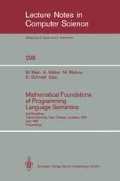Abstract
This paper presents a technique by which solutions to reflexive domain equations can be found in a certain category of complete metric spaces. The objects in this category are the (non-empty) metric spaces and the arrows consist of two maps: an isometric embedding and a non-distance-increasing left inverse to it. The solution of the equation is constructed as a fixed point of a functor over this category associated with the equation. The fixed point obtained is the direct limit (colimit) of a convergent tower. This construction works if the functor is contracting, which roughly amounts to the condition that it maps every embedding to an even denser one. We also present two additional conditions, each of which is sufficient to ensure that the functor has a unique fixed point (up to isomorphism). Finally, for a large class of functors, including function space constructions, we show that these conditions are satisfied, so that they are guaranteed to have a unique fixed point. The techniques we use are so reminiscent of Banach's fixed-point theorem that we feel justified to speak of a category-theoretic version of it.
Note: This work was carried out in the context of ESPRIT project 415: Parallel Architectures and Languages for Advanced Information Processing — a VLSI-directed approach.
Preview
Unable to display preview. Download preview PDF.
7. References
P. America, J. de Bakker, J. Kok, J. Rutten, A Denotional Semantics of a Parallel Object-Oriented Language, Technical Report (CS-R8626), Centre for Mathematics and Computer Science, Amsterdam, 1986.
J.W. de Bakker, J.I. Zucker, Processes and the Denotational Semantics of Concurrency, Information and Control 54 (1982), pp. 70–120.
J. Dugundji, Topology, Allen and Bacon, Rockleigh, N.J., 1966.
R. Engelking, General Topology, Polish Scientific Publishers, 1977.
H. Hahn, Reele Funktionen, Chelsea, New York, 1948.
D. Lehmann, Categories for Mathematical Semantics, in: Proc. 17th IEEE Symposium on Foundations of Computer Science, 1976.
S. Mac Lane, Categories for the Working Mathematician, Graduate Texts in Mathematics 5, Springer-Verlag, 1971.
D.S. Scott, Continuous Lattices, in: Toposes, Algebraic Geometry and Logic, Lecture Notes in Mathematics 274, Springer-Verlag, 1972, pp. 97–136.
M.B. Smyth, G.D. Plotkin, The Category-Theoretic Solution of Recursive Domain Equations, SIAM J. Comput, Vol. 11, No. 4, 1982, pp.761–783.
Author information
Authors and Affiliations
Editor information
Rights and permissions
Copyright information
© 1988 Springer-Verlag Berlin Heidelberg
About this paper
Cite this paper
America, P., Rutten, J. (1988). Solving reflexive domain equations in a category of complete metric spaces. In: Main, M., Melton, A., Mislove, M., Schmidt, D. (eds) Mathematical Foundations of Programming Language Semantics. MFPS 1987. Lecture Notes in Computer Science, vol 298. Springer, Berlin, Heidelberg. https://doi.org/10.1007/3-540-19020-1_13
Download citation
DOI: https://doi.org/10.1007/3-540-19020-1_13
Published:
Publisher Name: Springer, Berlin, Heidelberg
Print ISBN: 978-3-540-19020-2
Online ISBN: 978-3-540-38920-0
eBook Packages: Springer Book Archive

